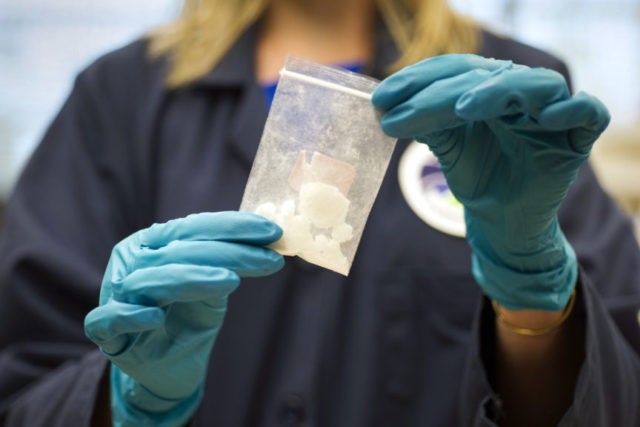U.S. President Donald Trump’s newly unveiled National Security Strategy (NSS) has deemed Latin American drug cartels who smuggle heroin and Chinese traffickers of the synthetic opioid fentanyl a threat to the United States for killing “tens of thousands of Americans each year.”
The NSS notes:
The illicit opioid epidemic, fed by drug cartels as well as Chinese fentanyl traffickers, kills tens of thousands of Americans each year. These organizations weaken our allies and partners too, by corrupting and undermining democratic institutions.
TCOs [transnational criminal organizations] are motivated by profit, power, and political influence. They exploit weak governance and enable other national security threats, including terrorist organizations. In addition, some state adversaries use TCOs as instruments of national power, offering them territorial sanctuary where they are free to conduct unattributable cyber intrusions, sabotage, theft, and political subversion.
The U.S. military and other experts have affiliated Latin American drug cartels with the Sunni al-Qaeda jihadist organization and Iran’s narco-terrorist proxy Hezbollah.
In 2016, more people died from drug use in the United States alone than were killed by terrorist groups across the world, Breitbart News determined using federal government data.
Trump has declared the illicit opioid epidemic currently gripping the United States a public health emergency, ordering his administration to provide immediate assistance to communities struggling with addiction to opium-based heroin, synthetic fentanyl, and other opiates.
Trump’s NSS pledges:
We will deny TCOs the ability to harm Americans. We will support public health efforts to halt the growth of illicit drug use in the United States, expand national and community-based prevention efforts, increase access to evidenced-based treatment for addiction, improve prescription drug monitoring, and provide training on substance use disorders for medical personnel.
While Latin American cartels are responsible for bringing most of the heroin into the United States, China is considered the top source of fentanyl in this country, federal data shows.
During his visit to China this year, Trump urged Chinese counterpart President Xi Jinping to combat the influx of fentanyl from China. President Xi reportedly agreed.
The Trump administration’s NSS describes “criminal cartels … bringing drugs and danger into our communities” as a threat that has proliferated in recent years, along with rogue regimes developing nuclear weapons, rival global powers, and radical Islamist terror groups.
“Non-state actors undermine social order through drug and human trafficking networks, which they use to commit violent crimes and kill thousands of American each year,” the strategy to fight national security threats facing the United States stresses.
The NSS designates drug cartels and fentanyl traffickers as non-state actors and TCOs.
“We will target jihadist terrorists and transnational criminal organizations at their source and dismantle their networks of support,” declares the Trump administration in its strategy, explaining:
Strengthening control over our borders and immigration system is central to national security, economic prosperity, and the rule of law. Terrorists, drug traffickers, and criminal cartels exploit porous borders and threaten U.S. security and public safety. These actors adapt quickly to outpace our defenses.
Trump’s National Security Strategy vows to annihilate TCOs, noting:
The United States must devote greater resources to dismantle transnational criminal organizations (TCOs) and their subsidiary networks. Some have established global supply chains that are comparable to Fortune 500 corporations. Every day they deliver drugs to American communities, fuel gang violence, and engage in cybercrime.
According to the latest information from the U.S. Centers for Disease Control (CDC), opioids like fentanyl (20,145) and heroin (15,446) dramatically fueled the unprecedented 64,070 drug overdose deaths in the United States last year.
Meanwhile, Latin American cartels, namely the U.S.-designated terrorist group known as the Revolutionary Armed Forces of Colombia (FARC), have reportedly increased cocaine availability in the United States in recent years, fueling the 10,619 fatal overdoses from the illicit drug last year.
Taken together, fatal overdoses of synthetic opioids, heroin, and cocaine made up the bulk, or about 72 percent, of drug-related deaths in the United States last year.

COMMENTS
Please let us know if you're having issues with commenting.